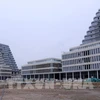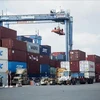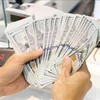Power shortages and high interest rates were likely to hamper production in factories over the coming months, the Ministry of Industry and Trade has been informed.
In an online meeting on June 9 between the ministry and departments and agencies, Minister Vu Huy Hoang said no production firm could pay current interest rates of 14-15 percent a year to buy raw materials.
Ministry's import-export department head Phan Van Chinh said material prices were escalating and production was continuing using materials bought many months ago.
In the case of seafood processing, high interest rates had prevented borrowings to invest in aquaculture and thus there was a shortage of fish for processing.
Hoang stressed that enterprises needed to ensure adequate supply of essential commodities for the domestic market.
The ministry would co-ordinate with concerned departments to help domestic enterprises address difficulties in accessing capital.
Business representatives at the meeting called for measures to control the quality of goods available in the market and to curb speculators from causing a hike in prices.
Nguyen Ngoc Minh, director of the Can Tho Department of Industry and Trade, said trade promotion programmes were not very effective because they suffered from inadequate capital.
Officials from other local departments said they would work together and come up with ways to promote exports and control imports.
The online meeting also discussed the effects of power cuts on production.
"Ba Ria-Vung Tau Province's industrial production has been reduced in the past months by shortage of power," provincial industry and trade department director Tran Thi Huong said.
"The Government wants the provinces to increase steel production to stabilise prices but we can't get the power we need," she said.
Hoang suggested that when Electricity of Vietnam was faced with reduced generation, it should maintain power supply to factories and the export sectors.
EVN deputy general director Dau Duc Khoi said electricity generators would be kept working to capacity and electricity would be imported from China to meet any shortfall or extra demand./.
In an online meeting on June 9 between the ministry and departments and agencies, Minister Vu Huy Hoang said no production firm could pay current interest rates of 14-15 percent a year to buy raw materials.
Ministry's import-export department head Phan Van Chinh said material prices were escalating and production was continuing using materials bought many months ago.
In the case of seafood processing, high interest rates had prevented borrowings to invest in aquaculture and thus there was a shortage of fish for processing.
Hoang stressed that enterprises needed to ensure adequate supply of essential commodities for the domestic market.
The ministry would co-ordinate with concerned departments to help domestic enterprises address difficulties in accessing capital.
Business representatives at the meeting called for measures to control the quality of goods available in the market and to curb speculators from causing a hike in prices.
Nguyen Ngoc Minh, director of the Can Tho Department of Industry and Trade, said trade promotion programmes were not very effective because they suffered from inadequate capital.
Officials from other local departments said they would work together and come up with ways to promote exports and control imports.
The online meeting also discussed the effects of power cuts on production.
"Ba Ria-Vung Tau Province's industrial production has been reduced in the past months by shortage of power," provincial industry and trade department director Tran Thi Huong said.
"The Government wants the provinces to increase steel production to stabilise prices but we can't get the power we need," she said.
Hoang suggested that when Electricity of Vietnam was faced with reduced generation, it should maintain power supply to factories and the export sectors.
EVN deputy general director Dau Duc Khoi said electricity generators would be kept working to capacity and electricity would be imported from China to meet any shortfall or extra demand./.



















